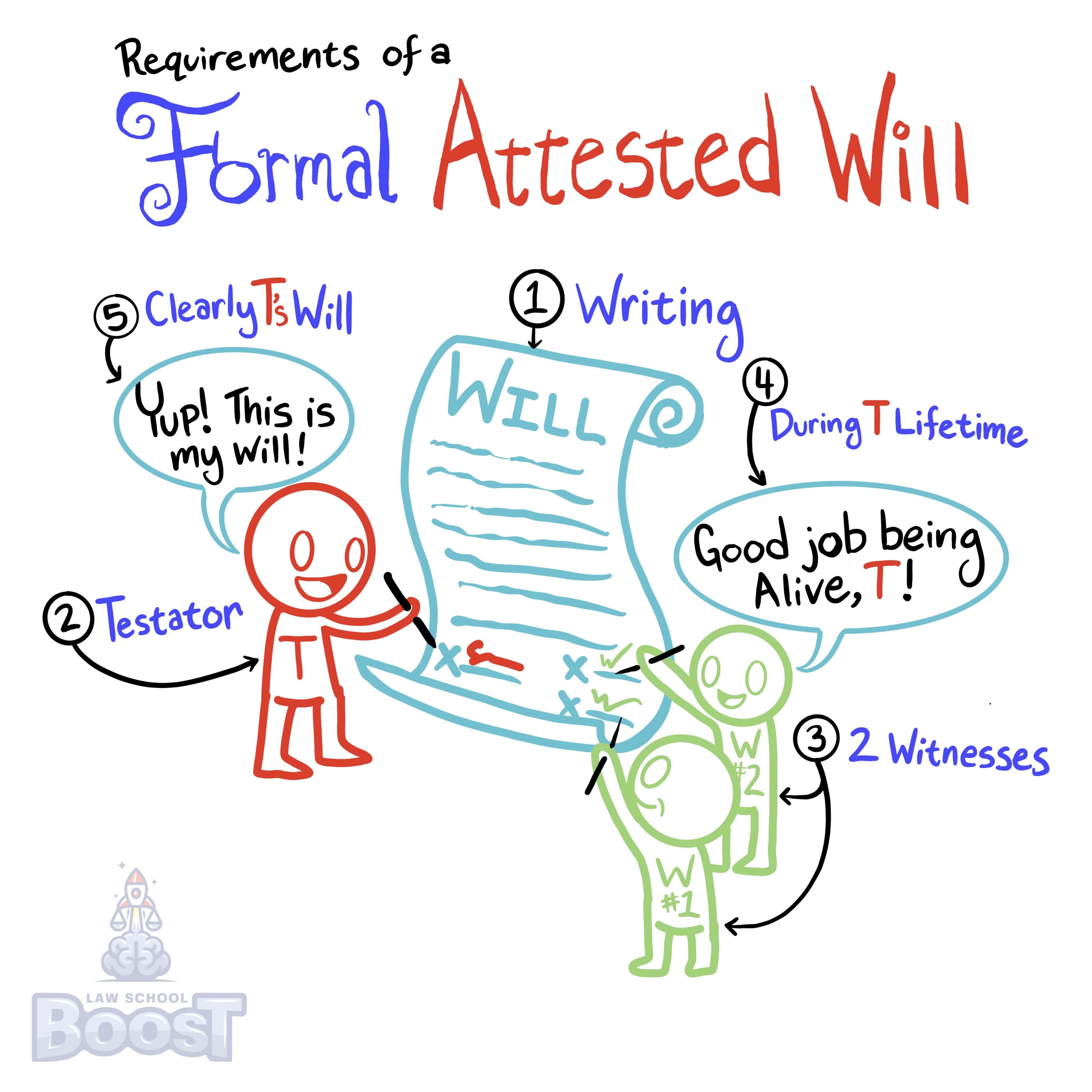😭
Wills • Execution of Wills
WILLS#001
Legal Definition
A formal attested will must be (1) in writing, (2) signed by the testator or signed by another in their presence at their direction, *(3)* acknowledged or signed in the joint presence of 2 witnesses by the testator; *(4)* signed by 2 witnesses during the testator's lifetime; and *(5)* understood by the witnesses to be the testator's will.
Plain English Explanation
A "formal attested will" is the kind of will you probably think about when you think of a will. It is the ideal type of will, which means it has some standards that must be followed in order to make sure everything is reliable. After all, when someone dies — they die. They aren't around anymore to provide assurances that the will represents what they wanted, so the following elements help ensure there are no shenanigans:
(1) The will must be in writing. Pretty obvious, right? We need a record of the will that can be examined and scrutinized.
(2) The will needs to be signed by the person who is leaving it, known as the testator. If for some reason the testator is unable to sign it themselves (for example, if they are disabled and unable to write their name), they are allowed to instruct someone else to sign on their behalf so long as they do so in the presence of the testator. This helps make sure the will the testator intended on being signed is the actual will that gets signed (and doesn't get changed or swapped out when they aren't looking).
(3) A will signed by the testator is pretty good, but it's still vulnerable to shenanigans. What happens if the testator dies and then someone modifies the will, or lies and claims they were instructed to sign a different will than intended? To keep this risk in check, the law requires there to be 2 witnesses present to either watch the testator sign the will, or at least watch the testator acknowledge that the piece of paper they are seeing is, in fact, the intended will.
(4) To prove those witnesses were there to watch it all happen, and to make a record of who they are for later scrutiny in case the court needs to investigate shenanigans, the witnesses must sign the will as well. Not necessarily at the moment they witness it happen, but at some point before the testator dies.
(5) Finally, it needs to be understood by the witnesses that the document being signed is, in fact, intended to be the testator's will.
(1) The will must be in writing. Pretty obvious, right? We need a record of the will that can be examined and scrutinized.
(2) The will needs to be signed by the person who is leaving it, known as the testator. If for some reason the testator is unable to sign it themselves (for example, if they are disabled and unable to write their name), they are allowed to instruct someone else to sign on their behalf so long as they do so in the presence of the testator. This helps make sure the will the testator intended on being signed is the actual will that gets signed (and doesn't get changed or swapped out when they aren't looking).
(3) A will signed by the testator is pretty good, but it's still vulnerable to shenanigans. What happens if the testator dies and then someone modifies the will, or lies and claims they were instructed to sign a different will than intended? To keep this risk in check, the law requires there to be 2 witnesses present to either watch the testator sign the will, or at least watch the testator acknowledge that the piece of paper they are seeing is, in fact, the intended will.
(4) To prove those witnesses were there to watch it all happen, and to make a record of who they are for later scrutiny in case the court needs to investigate shenanigans, the witnesses must sign the will as well. Not necessarily at the moment they witness it happen, but at some point before the testator dies.
(5) Finally, it needs to be understood by the witnesses that the document being signed is, in fact, intended to be the testator's will.
Hypothetical
Hypo 1: Bob finished writing his will. He invites Amy and Sam over and says, "Hey, do me a favor and watch me sign this." Amy and Sam watch Bob sign a sheet of paper. Then Bob says, "Do me a favor, and sign the sheet of paper." Amy and Sam are confused, but do so. Bob says, "Thanks!" and kicks them out of his house. Result: This is not a valid, formal attested will. Yes, it was signed by Bob, and yes it was witnessed by Amy and Sam who also signed that they watched Bob sign a piece of paper. But Amy and Sam had no idea what the piece of paper was. It was not understood that it was Bob's will and, thus, their act of witnessing Bob sign the document is ineffective.
Visual Aids

Related Concepts
In California, what are the requirements for a will to be admitted to probate?
What is a conditional will and when is it probated?
What is a holographic will and what are its requirements to be valid?
What is an interested witness?
What is probate?
What is the consequence of having an interested witness?
What is the harmless error doctrine and what wills does it apply to?


